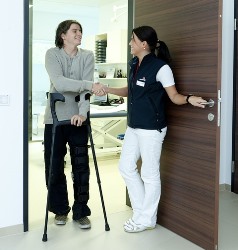How to Choose the Best LPN or LVN School Near Cambridge Massachusetts
 Once you have chosen a fulfilling vocation in the field of nursing, it's imperative that you find a Licensed Practical Nurse (LPN) college near Cambridge MA that will furnish the proper training. If you reside in Texas or California, then you will be searching for a Licensed Vocational Nurse (LVN) school instead. There is no difference, other than the names, between an LPN and an LVN. They both undertake the same job functions and work in medical facilities under the guidance of Registered Nurses (RN) or Doctors. However their responsibilities do fluctuate depending on the state they practice in, which we will talk about in the following section. When initiating their search for schools, many potential nursing students begin with the ones that are the nearest to their homes or that are the least costly. While tuition and location are significant considerations, they are not the only criteria that you should base your decision on. Other concerns, for example if the schools are accredited or have high pass rates on the licensing exam are extremely important as well. There are additional questions that you should ask potential schools before enrolling in a LPN or LVN program that we will talk about later in this article. But first, let's look at the function of an LPN and what is involved in the instruction and licensing process.
Once you have chosen a fulfilling vocation in the field of nursing, it's imperative that you find a Licensed Practical Nurse (LPN) college near Cambridge MA that will furnish the proper training. If you reside in Texas or California, then you will be searching for a Licensed Vocational Nurse (LVN) school instead. There is no difference, other than the names, between an LPN and an LVN. They both undertake the same job functions and work in medical facilities under the guidance of Registered Nurses (RN) or Doctors. However their responsibilities do fluctuate depending on the state they practice in, which we will talk about in the following section. When initiating their search for schools, many potential nursing students begin with the ones that are the nearest to their homes or that are the least costly. While tuition and location are significant considerations, they are not the only criteria that you should base your decision on. Other concerns, for example if the schools are accredited or have high pass rates on the licensing exam are extremely important as well. There are additional questions that you should ask potential schools before enrolling in a LPN or LVN program that we will talk about later in this article. But first, let's look at the function of an LPN and what is involved in the instruction and licensing process.
It Only Takes a Few Minutes to Start Your LPN or LVN Career Below
LPN and LVN Job Description

Licensed Practical Nurses have many duties that they perform in the Cambridge MA medical facilities where they practice. As their titles signify, they are mandated to be licensed in all states, including Massachusetts. Even though they may be responsible for overseeing Certified Nursing Assistants (CNA), they themselves normally work under the guidance of either an RN or a doctor. The healthcare facilities where they work are numerous and varied, including hospitals, medical clinics, schools, and long-term care facilities. Anywhere that you can find patients in need of medical assistance is their dominion. Every state not only oversees their licensing, but also what functions an LPN can and can't perform. So depending on the state, their everyday job functions may include:
- Measuring vital signs
- Administering medicines
- Initiating IV drips
- Overseeing patients
- Collecting blood or urine samples
- Managing patient records
- Supporting physicians or Registered nurses with procedures
In addition to their job functions being regulated by each state, the healthcare facilities or other Cambridge MA healthcare providers where LPNs work can additionally limit their job roles within those parameters. Also, they can practice in numerous specialties of nursing, such as long-term care, critical care, oncology and cardiology.
LPN and LVN Training
There are basically two academic credentials available that provide education to become an LPN or LVN near Cambridge MA. The one that can be finished in the shortest period of time, typically about one year, is the certificate or diploma course. The other alternative is to obtain a Practical Nursing Associate Degree. These LPN programs are broader in nature than the diploma alternative and commonly require 2 years to finish. The advantage of Associate Degrees, in addition to offering a higher credential and more extensive training, are that they provide more transferable credit toward a Bachelor's Degree in nursing. No matter the type of credential you seek, it needs to be state approved and ideally accredited by the National League for Nursing Accrediting Commission (NLNAC) or another national accrediting organization. The NLNAC guarantees that the core curriculum effectively prepares students to become Practical Nurses, and that most graduates pass the 50 state required NCLEX-PN licensing exam.Attending LVN and LPN Online Courses
 Attending LPN schools online is emerging as a more in demand way to get instruction and earn a nursing certificate or degree in Cambridge MA. Some schools will require attending on campus for a component of the training, and almost all programs call for a specific amount of clinical rotation hours carried out in a local healthcare center. But since the remainder of the training may be accessed online, this option may be a more accommodating answer to finding the free time to attend college for many students. Pertaining to tuition, some online degree programs are cheaper than other on campus options. Even supplemental expenses such as for commuting and study materials may be lessened, helping to make education more easily affordable. And numerous online programs are accredited by U.S. Department of Education recognized organizations. And so if your work and household obligations have left you with very little time to work toward your academic goals, perhaps an online LPN training program will make it easier to fit a degree into your busy schedule.
Attending LPN schools online is emerging as a more in demand way to get instruction and earn a nursing certificate or degree in Cambridge MA. Some schools will require attending on campus for a component of the training, and almost all programs call for a specific amount of clinical rotation hours carried out in a local healthcare center. But since the remainder of the training may be accessed online, this option may be a more accommodating answer to finding the free time to attend college for many students. Pertaining to tuition, some online degree programs are cheaper than other on campus options. Even supplemental expenses such as for commuting and study materials may be lessened, helping to make education more easily affordable. And numerous online programs are accredited by U.S. Department of Education recognized organizations. And so if your work and household obligations have left you with very little time to work toward your academic goals, perhaps an online LPN training program will make it easier to fit a degree into your busy schedule.
Questions to Ask LPN and LVN Schools
Now that you have decided on obtaining your LPN certificate, and if you will attend classes on campus or on the internet, you can utilize the following checklist to begin narrowing down your choices. As you probably are aware, there are a large number of nursing schools and colleges near Cambridge Ma as well as within Massachusetts and throughout the United States. So it is necessary to lower the number of schools to choose from in order that you will have a manageable list. As we already mentioned, the site of the school and the price of tuition are probably going to be the primary two things that you will look at. But as we also stressed, they should not be your only qualifiers. So prior to making your final decision, use the following questions to see how your selection compares to the other schools.
- Accreditation. It's a good idea to make sure that the certificate program as well as the school are accredited by a U.S. Department of Education acknowledged accrediting agency. In addition to helping ensure that you receive a quality education, it may help in acquiring financial aid or student loans, which are oftentimes not available for non-accredited schools near Cambridge Massachusetts.
- Reputation. Look at online rating services to see what the assessments are for each of the LPN schools you are looking into. Ask the accrediting organizations for their reviews as well. In addition, contact the Massachusetts school licensing authority to check out if there are any complaints or compliance issues. Finally, you can contact some local Cambridge MA healthcare organizations you're interested in working for after graduation and ask what their assessments are of the schools as well.
- Internship Programs. The most effective way to get experience as a Licensed Practical Nurse is to work in a clinical environment. Virtually all nursing degree programs require a certain number of clinical hours be completed. A number of states have minimum clinical hour prerequisites for licensing as well. Find out if the schools have a working relationship with nearby Cambridge MA community hospitals, clinics or labs and assist with the placing of students in internships. Also, it's important that you choose a school that offers clinical training in the type of facility you are most interested in. For example, if you want training and experience in pediatric care, make sure that the school you choose provides adequate clinical rotation in an area Pediatric Hospital.
- Licensing Preparation. Licensing criteria for LPNs differ from state to state. In all states, a passing score is needed on the National Council Licensure Examination (NCLEX-PN) together with graduation from an approved school. Certain states require a certain number of clinical hours be completed, as well as the passing of additional tests. It's imperative that the school you are attending not only delivers a top-notch education, but also readies you to meet the minimum licensing standards for Massachusetts or the state where you will be practicing.
- Graduation and Job Placement Rates. Find out from the LPN schools you are considering what their graduation rates are as well as how long on average it takes students to complete their programs. A low graduation rate may be an indication that students were dissatisfied with the program and dropped out. It's also imperative that the schools have high job placement rates. A high rate will not only verify that the school has a good reputation within the Cambridge MA healthcare community, but that it also has the network of relationships to assist students obtain employment.
- NCLEX Exam Pass Rate. Once you receive your certificate or diploma, you must sign up for and pass the National Council Licensure Examination for Practical Nurses (NCLEX-PN). Enrolling in a school with at least a 75% pass rate is highly preferred. Lower pass rates may indicate that a school’s program, curriculum or instructors are ineffective in teaching its students. You can find out from the school what their passing rate is for the last 5 years, or request the information from the State Board of Nursing.
Learn How to Become an LVN or LPN in Cambridge
Choose the Right Cambridge Licensed Vocational Nurse Program
Deciding on the ideal Licensed Practical Nurse school is arguably the most crucial first step to launching a new career in the health care industry. There are a number of factors that you should consider when selecting a nursing school. These variables will be prioritized differently depending on your existing career goals, lifestyle, and financial situation. As we have emphasized in this content, it is important that you enroll in an LPN school and a certificate or degree program that are both accredited and have exceptional reputations within the health care community. By utilizing our checklist of qualifying questions, you will be able to produce a shortlist of schools to choose from so that you can make your ultimate selection. And with the proper degree and training, combined with your dedication and ambition to succeed, you can become an LPN in Cambridge Massachusetts.
CAMBRIDGE LPN OR LVN PROGRAMS NEAR ME | CAMBRIDGE LPN OR LVN SCHOOLS
